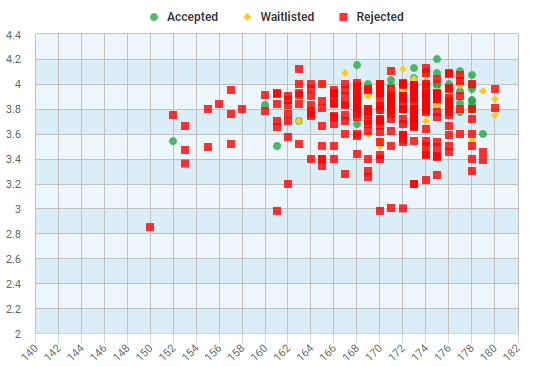BYU Law School
General Info

The J. Reuben Clark Law School is one of the professional graduate schools of Brigham Young University in Provo, Utah. Established in 1973, the school was named after former Ambassador, Undersecretary of State, and LDS General Authority J. Reuben Clark and offers both J.D. and LL.M. degrees. It is renowned for its emphasis on ethics, legal scholarship, religious and family law, and its low tuition. Although comparatively young, the J. Reuben Clark Law School consistently ranks among the top 50 law schools in the United States. Currently, the J. Reuben Clark Law School is ranked #44 by U.S. News & World Report.
Contact information
- (Website) https://www.law.byu.edu/
- (Admissions Dean) admissions@law.byu.edu
- (Location) Provo, UT
BYU Law School Admissions
BYU Law School is considered a Competitive law school, which accepts only 41% of its applicants. Comparatively, Byu is Significantly Lower than the average cost for law school.
| Applications | Offers | Matriculated | |
|---|---|---|---|
| Class of 2029 | 461 | 186 (40.35%) | 128 (27.8%) |
| 25% | Median | 75% | |
| GPA | 3.45 | 3.77 | 3.86 |
| LSAT | 156 | 161 | 164 |
Tuition And Financial Aid
| In-State Resident | Non-Resident | |
|---|---|---|
| Full Time | $11,970 | $23,940 |
| Part Time | N/A | N/A |
Living Expenses
- Living on-campus: $20,080
- Living off-campus: $20,080
- Living at home: $7,992
Important Dates
- Early Decision 1: N/A
- Early Decision 2: N/A
- Regular Decision: N/A
- Application Fee: $50
BYU Law School Admissions Predictor Tool
BYU Law School COMPARISON TOOL
BYU Law School


BYU Law School Community
BYU Law School is considered to have a Somewhat Favorable student to faculty ratio. The average class size for 1L sections is approximately Above Average compared to other law schools. Student diversity at Byu is Below Average.
Student body
Faculty Statistics
- Full Time: 24
- Part Time: 37
Faculty
- # Female Faculty: 18
- # Minority Faculty: 4
Ratio
16.8 Students
1 Faculty
Housing Options
- On Campus Housing: No
- Graduate Housing: No
- Law Specific Housing: No
BYU Law School Curriculum
The size of 1L sections affects the quality and consistency of teaching in law schools. Generally with smaller 1L section sizes, students receive more individualized attention. BYU Law School 1L section size is 6% smaller than law schools in Utah and 34% smaller than all PRIVATE law schools.
1L Section Size Comparison
Positions Available in Advanced Courses
- Simulation Courses: 811
- Faculty Supervised Clinics: 165
Students Involved in Advanced Activities
- Field Placements: 287
- Law Journals: 176
- Moot Court/Mock Trials: 0
Attrition Rates
- First Year: 3.2%
- Second Year: 0.0%
- Third Year: 0.7%
- Fourth Year: 0.0%
BYU Law School Employment
Deciding to attend law school requires a large financial investment with the goal of securing employment upon graduation. The BYU Law School class of 2024 had an employment rate of 93% with 0% pursuing an additional degree.
Employment Comparison
In 2024, 76.6%% of students reported their employment status 9-months after graduation.
Type of Employment
- Law Firms: 45.0%
- Business: 13.0%
- Government: 20.0%
- Public Interest: 5.0%
- Academia: 2.0%
- Utah: 48%
- California: 19%
- Nevada: 6%
Bar Passage Rates
- Reporting: 76.6%
- First Time Takers: 137
- Average School: 82.9%
- Average State: 81.7%
- Pass Difference: 1.2%
Top Bar Jurisdiction
- Utah: 86.8%
- Passed: 61 of 75 (81.3%)
- State Average: 81.7%
- Difference: -5.5%
